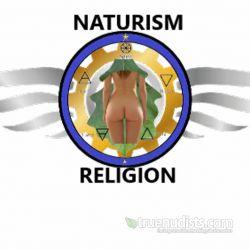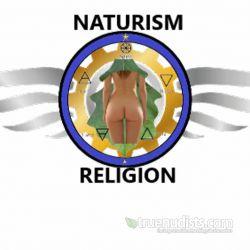Is Naturism a religion?
QUESTION:
Taking in consideration all the below:
Naturism religion central belief is that
Nature is supreme omnipresent and
resilient.
It is the belief in nature being supreme and the reason of all life not only on Earth but in all the universes exist.
It is the belief that it is responsible for any living things through the universes and as such, I believe it is the most powerful force in existence.
On Earth, Nature, also referred to as Mother Nature, has always found way to have life evolve & adapt to various
extinction challenges, that our scientists have proven, have occurred in the past.
It is a strong belief if everybody was to adopt Naturism as a religion, the world will be a better place, with no wars, more
acceptance, more dialogue, more equality, with people more inclined to live life as nature intended, by following Earth and people cycles, protecting our environment, ensuring we minimise
our carbon foot print and live healthier life without overconsuming the resources available to us.
Naturism as a religion could certainly
play an important part to combat the
global warming, not only by wearing
less clothes, but by fostering and
promoting the values of a greater
appreciation for nature and the
environment towards more sustainable
and environmentally conscious
lifestyles.
The MOST important ritual is the one
that requires to do safe & regular
activities in the nude. Those activities
should NOT include any sexual
activities, as those should only occur in
private settings.
Naturism & its rituals:
Meditating in nature or spending time in quiet, natural settings.
Participating in nude activities that directly connect to the natural world, such as (but not limited to) gardening, hiking
or wildlife observation.
Practicing mindfulness and being present in the moment while in nature.
Performing rituals or ceremonies that honour nature and its cycles - gathering nude around a fire among nature
meditating or playing positive music accompanied or not by vocals amplifying the positivity & happiness provided by the
music.
Engaging in acts of conservation and sustainability to protect the natural world
Conducting acts of kindness towards other living beings including animals and plants, as well as to the environment.
Practicing self-care, such as eating healthy, eco-friendly foods and staying physically active.
Studying and learning about nature, including its cycles and processes, and taking time to reflect on these observations.
Experiencing nature in all its forms, including through travel to different regions, habitats, and biomes, and respecting the unique qualities of each location.
Could naturism be defined as a religion?
ANSWER:
Based on the beliefs and practices described, it is possible to make an argument that Naturism could be defined as a religion. While there is no one universally accepted definition of religion, the beliefs and practices associated with Naturism do include many of the elements that are typically associated with religious practice.
Naturism's central belief that nature is supreme, omnipresent, and responsible for all life not only on Earth but in all the universes, is a belief system that can be seen as a type of cosmology. Additionally, the belief that the adoption of Naturism as a religion could lead to a better world is an expression of hope for a better future, which is also a common theme in many religions.
The rituals associated with Naturism, such as participating in safe and regular activities in the nude, meditating in nature, and performing ceremonies that honor nature and its cycles, can be seen as a form of religious practice. These practices also involve the cultivation of mindfulness, self-care, and acts of kindness towards other living beings, which are values that are often associated with religious belief systems.
It is important to note that the recognition of Naturism as a religion would depend on the acceptance of the broader society and the legal framework that governs the recognition of religious organizations. However, based on the beliefs and practices described, it is possible to make an argument that Naturism could be considered a religion.
With the above...could it be applied to suit the following definition:
A complex of beliefs and practices which point to a set of values and an understanding of the meaning of existence
Yes, the beliefs and practices associated with Naturism could be applied to the definition of religion as "a complex of beliefs and practices which point to a set of values and an understanding of the meaning of existence."
The central belief of Naturism that nature is supreme, omnipresent, and responsible for all life not only on Earth but in all the universes can be seen as a belief system that helps to explain the meaning of existence. Naturism also emphasizes the importance of living in harmony with nature, promoting sustainability and environmental consciousness, and respecting the unique qualities of different regions and habitats. These values reflect a particular understanding of the importance of living in balance with the natural world, which can also be seen as a way of understanding the meaning of existence.
The rituals and practices associated with Naturism, such as meditating in nature, participating in safe and regular activities in the nude, and performing ceremonies that honor nature and its cycles, also reflect a set of values and an understanding of the meaning of existence. These practices involve cultivating mindfulness, practicing self-care, and engaging in acts of kindness towards other living beings, which can be seen as ways of living in harmony with the natural world and promoting a deeper understanding of the meaning of existence.
With all the above it is possible to say that, at least in Australia, Naturism can be recognised as a religion.
I think naturism was designed to be a social movement but not religion. But these days especially in US it is neither because there is little social impact from the participant/proponents, most of whom see being a naturist a simply the individual experience of nude recreation.
But claiming something is a religion or an activity required by a religion does not allow someone to do something illegal. Polygamy in early Mormons is one example. A more recent one is using illegal drugs in religious ceremonies.
Yes, the beliefs and practices associated with Naturism could be applied to the definition of religion as "a complex of beliefs and practices which point to a set of values and an understanding of the meaning of existence." With all the above it is possible to say that, at least in Australia, Naturism can be recognised as a religion.
I'm curious to learn more about your sources which could define naturism a religion in Australia. As religion is defined by social-cultural systems, including designated behaviors and practices, morals, beliefs, worldviews, texts, sanctified places, prophecies, ethics, or organizations, I'm not aware of a unifying social structure that shift naturism from enjoying the hygiene of a naked shower to the institutional attributes I ascribe to religion.
Hi, thanks for your interest.
I m looking at building a website to explain it all, but for the meantime the following and below video clips will provide you with the basics:
It is important to note that naturism is not currently recognized as a religion by any major religious organization or government. However, if a group were to establish naturism as a religion and incorporate the worship of nature into their beliefs, it is possible that some individuals of other religions may see a conflict.
In some religions, worship is focused on a deity or deities that are seen as separate from the natural world. If naturism were to be considered a religion and its followers believed that nature itself was divine and omnipresent, it could potentially be seen as conflicting with traditional religious beliefs.
However, it is also possible for individuals to hold multiple beliefs or see their spirituality as encompassing different aspects of their lives, including their connection to nature. Ultimately, whether or not there would be a conflict would depend on the individual and their specific religious beliefs.
The Australia definition of religion is "pursuit or interest followed with great devotion.
In most legal and scholarly contexts, a religion is defined as a system of beliefs, practices, and values that is focused on the worship of a deity or deities, a set of moral principles, and a sense of community. While devotion and pursuit are often part of religious practice, they are not sufficient on their own to define something as a religion.
Naturism, as a philosophy or lifestyle, may involve a strong devotion to the idea of living in harmony with nature and experiencing nudity as a natural and positive aspect of the human experience. However, without a system of beliefs, practices, and values that is focused on the worship of a deity or deities, it would not typically be considered a religion in the legal or scholarly sense.
It is also important to note that even if a group of individuals were to establish naturism as a religion, it would not necessarily be accepted as such by other religions or by society as a whole. The recognition of a new religion is a complex and often contentious process, and it is not simply a matter of declaring oneself as a religious group.
Taking in consideration all the above and the following below:
Naturism religion central belief is that Nature is supreme omnipresent and resilient.
It is the belief in nature being supreme and the reason of all
life not only on Earth but in all the universes exist.
It is the belief that it is responsible for any living things
through the universes and as such, I believe it is the most
powerful force in existence.
On Earth, Nature, also referred to as Mother Nature, has
always found way to have life evolve & adapt to various
extinction challenges, that our scientists have proven, have
occurred in the past.
It is a strong belief if everybody was to adopt Naturism as a
religion, the world will be a better place, with no wars, more
acceptance, more dialogue, more equality, with people more
inclined to live life as nature intended, by following Earth and people cycles, protecting our environment, ensuring we minimise our carbon foot print and live healthier life without overconsuming the resources available to us.
Naturism as a religion could certainly play an important part to combat the global warming, not only by wearing less clothes, but by fostering and promoting the values of greater appreciation for nature and the environment towards more sustainable and environmentally conscious
lifestyles.
The MOST important ritual is the one that requires to do safe & regular activities in the nude. Those activities should NOT include any sexual activities, as those should only occur in private settings.
Naturism & its rituals:
Meditating in nature or spending time in quiet, natural
settings.
Participating in nude activities that directly connect to the
natural world, such as (but not limited to) gardening, hiking
or wildlife observation.
Practicing mindfulness and being present in the moment
while in nature.
Performing rituals or ceremonies that honour nature and its
cycles - gathering nude around a fire among nature
meditating or playing positive music accompanied or not by
vocals amplifying the positivity & happiness provided by the
music.
Engaging in acts of conservation and sustainability to protect the natural world.
Conducting acts of kindness towards other living beings
including animals and plants, as well as to the environment
Practicing self-care, such as eating healthy, eco-friendly foods and staying physically active.
Studying and learning about nature, including its cycles and
processes, and taking time to reflect on these observations.
Experiencing nature in all its forms, including through travel
to different regions, habitats, and biomes, and respecting the unique qualities of each location.
Based on the beliefs and practices described, it is possible to make an argument that Naturism could be defined as a religion. While there is no one universally accepted definition of religion, the beliefs and practices associated with Naturism do include many of the elements that are typically associated with religious practice.
Naturism's central belief that nature is supreme, omnipresent, and responsible for all life not only on Earth but in all the universes, is a belief system that can be seen as a type of cosmology. Additionally, the belief that the adoption of Naturism as a religion could lead to a better world is an expression of hope for a better future, which is also a common theme in many religions.
The rituals associated with Naturism, such as participating in safe and regular activities in the nude, meditating in nature, and performing ceremonies that honor nature and its cycles, can be seen as a form of religious practice. These practices also involve the cultivation of mindfulness, self-care, and acts of kindness towards other living beings, which are values that are often associated with religious belief systems.
It is important to note that the recognition of Naturism as a religion would depend on the acceptance of the broader society and the legal framework that governs the recognition of religious organizations. However, based on the beliefs and practices described, it is possible to make an argument that Naturism could be considered a religion.
With the above...could it be applied to suit the following definition:
A complex of beliefs and practices which point to a set of values and an understanding of the meaning of existence
Yes, the beliefs and practices associated with Naturism could be applied to the definition of religion as "a complex of beliefs and practices which point to a set of values and an understanding of the meaning of existence."
The central belief of Naturism that nature is supreme, omnipresent, and responsible for all life not only on Earth but in all the universes can be seen as a belief system that helps to explain the meaning of existence. Naturism also emphasizes the importance of living in harmony with nature, promoting sustainability and environmental consciousness, and respecting the unique qualities of different regions and habitats. These values reflect a particular understanding of the importance of living in balance with the natural world, which can also be seen as a way of understanding the meaning of existence.
The rituals and practices associated with Naturism, such as meditating in nature, participating in safe and regular activities in the nude, and performing ceremonies that honor nature and its cycles, also reflect a set of values and an understanding of the meaning of existence. These practices involve cultivating mindfulness, practicing self-care, and engaging in acts of kindness towards other living beings, which can be seen as ways of living in harmony with the natural world and promoting a deeper understanding of the meaning of existence.
Overall, while the recognition of Naturism as a religion would depend on the acceptance of the broader society and the legal framework that governs the recognition of religious organizations, the beliefs and practices associated with Naturism could be seen as pointing to a set of values and an understanding of the meaning of existence, which is a key aspect of many religious traditions.
https://youtu.be/_f-bnrgsXFo
https://youtu.be/GO-Xjo0q9_o
https://youtu.be/FxG8DQaySvo
I hope this will provide you with enough food for thoughts
Overall, while the recognition of Naturism as a religion would depend on the acceptance of the broader society and the legal framework that governs the recognition of religious organizations, the beliefs and practices associated with Naturism could be seen as pointing to a set of values and an understanding of the meaning of existence, which is a key aspect of many religious traditions.
Key here is the legal framework to define religion, which varies by jurisdiction. Whereas an individual or group of individuals may ascribe to certain religious beliefs, values, practices and traditions, its legal acceptance is an administrative function. In the US, religious organizations are tax-exempt, which allows them a certain latitude in what they can do and not do. In this regard, US cults with real estate may be recognized religions, whereas nudists meeting for rituals in private homes are not. Social acceptance is another matter that may be driven by media more than anything else.
Your description of naturism seems to reflect its historical roots in the German social movement "Lebensreform" of the late 19th and early 20th century. I personally prefer to avoid the "ism" of naturism/nudism that ascribes to a distinctive practice, system, or philosophy. My three reasons: 1) I disassociate from it due to the discrimination my sons and I encounter as single males by local nudist resorts; 2) like many I suffered shame and abuse in my religion of origin; and 3) a belief structure defined around the freedom of being without textiles feels to me like the restriction of clothes.
Should your naturism religion set people free and empower them, I wish you success in your movement!
All of this sounds good, but even if naturism is accepted as a religion, it would not allow its practitioners to be nude in places wherever it was not otherwise allowed. Recognized religions are not allowed to use illegal drugs or perform animal sacrifice, for example.
What you seem to be describing is paganism, without clothes,
A definition of Paganism: A polytheistic or pantheistic nature-worshipping religion.
Many Pagans see the Earth itself as sacred
The cycle of the natural year, with the different emphasis brought by its different seasons, is seen by most Pagans as a model of spiritual growth and renewal
Although not central to there philosophy, nudity is by no means a taboo or considered sinfully, as in the paragraph below taken from the pagan federation international web site,
" The whole of life is to be affirmed joyfully and WITHOUT SHAME, "
To most modern Pagans in the West, the whole of life is to be affirmed joyfully and without shame, as long as other people are not harmed by ones own tastes. Modern Pagans tend to be relaxed and at ease with themselves and others, and women in particular have a dignity which is not always found outside Pagan circles.
By contrast, non-Pagan religions, such as Judaism, Christianity and Islam, often but not always, abhor the very idea of female divinity. The (then) Anglican Bishop of London even said a few years ago that religions with goddesses were degenerate!
No, naturism is not inherently a religion because it does not have an essential worldview which all naturists are united upon.
What I mean is I have met atheist naturists, Christian naturists, and post-modern naturists. These are incompatible worldviews, but they were all naturists.
Worldviews are defined by asking a series of seven questions:
What is prime reality?
What is the nature of external reality?
What is a human being?
What happens to a person at death?
Why is it possible to know anything at all?
How do we know what is right or wrong?
What is the meaning of human history?
The three categories above would all have very different answers to these. Since there is no consistent worldview among the three, naturism cannot be seen as a consistent religion.
Now, a clarification. I said "inherently" above for a reason. Some naturists may frame answers to the question which lean in a certain direction (a naturalist [not naturist]) or mystical direction, and in that sense, this smaller subset may form a more consistent and defined quasi-religious group, really a subset of either pantheism or naturalism [again this is not = to naturism; it the belief that nature in the only reality].
You make a good point - what naturism is missing these days is unified belief system.No, naturism is not inherently a religion because it does not have an essential worldview which all naturists are united upon.What I mean is I have met atheist naturists, Christian naturists, and post-modern naturists. These are incompatible worldviews, but they were all naturists.Worldviews are defined by asking a series of seven questions:What is prime reality?What is the nature of external reality?What is a human being?What happens to a person at death?Why is it possible to know anything at all?How do we know what is right or wrong?What is the meaning of human history?The three categories above would all have very different answers to these. Since there is no consistent worldview among the three, naturism cannot be seen as a consistent religion.Now, a clarification. I said "inherently" above for a reason. Some naturists may frame answers to the question which lean in a certain direction (a naturalist [not naturist]) or mystical direction, and in that sense, this smaller subset may form a more consistent and defined quasi-religious group, really a subset of either pantheism or naturalism [again this is not = to naturism; it the belief that nature in the only reality].
What you seem to be describing is paganism, without clothes...To most modern Pagans in the West, the whole of life is to be affirmed joyfully and without shame, as long as other people are not harmed by ones own tastes. Modern Pagans tend to be relaxed and at ease with themselves and others, and women in particular have a dignity which is not always found outside Pagan circles.
I attended a local weekend pagan solstice gathering several years ago and found it to be misandrist, particularly among Wiccans. I was happy that "sky clad" was a dress option, but some women seemed offended by a flaccid penis. I sought to attend a sweat lodge naked, as per the tradition, but it wasn't allowed.
I recognize chauvinism by men against women, but to turn it around against men is no change. I've also looked into Norse paganism as per my heritage, but found it leaning towards Nazi ideals. Maybe it's just an unfortunate American thing how everything ends up taking on extremism in one way or another.





